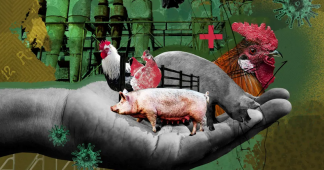By Yangos Andreadis*
Untrained in tragedy: Unprepared to face it, when it takes the biological form of an epidemic like Covid19, as well in difficulty to foresee and react, when it concerns a cultural, political or military threat. And, on the other hand, in difficulty to read Tragedy- Greek, Elizabethan or other- to transform its texts into living logos and form and decipher their messages that, although ancient and symbolic, conserve a dramatic importance for our very existence.
Two points must be clear, right from the beginning. First, what happens in Greece is not our countries’ sad privilege: All three issues, the pandemic, war, and the crisis of culture, have a universal dimension. And, second, the problems concerning epidemic decease, as well as those connected with politics and symbolic forms are all, in various but relied senses, cultural. This paper is divided in three parts. What follows here might be entitled “Untrained in tragedy I”: The Pandemic.
In what sense we are justified to think about Covid19 in cultural terms? Epidemics seem coetaneous with humanity and very probably with other living species. Traditional healers and doctors were not the only ones to deal with it. From the times of Homer, Sophocles and Thucydides to Chausser, Boccaccio and to Gros’ painting “Bonaparte visiting the plagues’ victims at Jaffa” and Antonin Artauds’ essay “Le théatre et la peste”, literature, drama, visual arts, history and other sectors of culture have kept proposing their respective diagnosis, complementary or contrasting with those of medicine.
My approach in the present paper differs much from the traditional view persisting from ancient times to our days. Such view, masterfully exposed in the first Rhapsody of the Iliad, Oedipus the tyrant or in Boccaccio’s Decameron, constantly explains the explosion of epidemic, be it cholera, plague, typhoid fever or other, by moral factors: crimes or other sinful deeds committed by individuals or collectivities. In such perspective epidemic was considered a divine punishment due to the transgression of divine, human and/or natural laws and this led to the conclusion that human societies, or at least some of their members, were guilty of what was happening. The result of such a diagnosis was a more or less permanent and necessary link between decease and human guilt. Individual patients and suffering collectivities became the victims of guilt, shame and/or a blind exteriorized/interiorized aggressiveness.
Regarding the present pandemic, many people throughout the world tend to consider that it emergence is due to human errors or crimes. The case of Covid19 resists however such diagnosis – be it metaphysical, political or moral. It seems very unlikely that it either has escaped from a Chinese laboratory or that it utterly is the instrument of a diabolical Chinese plan against humanity. And, even if it really has originated from a Chinese food market of living wild animals, one cannot say why it has appeared now and not some decades or centuries ago. Some scientists have claimed that the appearance of epidemics and pandemics might obey to a kind of periodicity. Yet, the reasons and the laws of such periodicity remain unknown.
Politics, economy, ecology cannot explain the emergence of the pandemic. On the contrary, they have much to do with how governments and societies around the world have dealt with it after it has emerged. And, to put it in simple words, one may say that they have proved to be preponderant over the medical side of the affair. The way in which most, if not all, governments have reacted to the threat represented by Covid19, proves that they were unable and/or unwilling to change their global views previous to the pandemic. Herd immunity and other nonsense of the kind have clearly contributed to many more deaths, yet they were only part of a much wider phenomenon: Governments and other people in power around the world all openly or implicitly adhered to the opinion Mr. Schoible has had the courage to express openly: The safeguard of human life should not become the worlds’ number one concern– implying that economy, power etc. are the things that count. His statement synthesizes the essence of the contemporary dominant culture -or rather the anti-culture- signing the formal act of depreciation of humanism.
The dramatic planetary proliferation of the pandemic is to a great extent due to the predominance of such opinions overtly expressing what most governments have done in an official or unofficial way. The dismantlement of the public sanitary system in countries like the USA and Italy, due to neoliberal “reforms”, obeying to similar “economic” principles, has proved to be a major negative factor. But there also other reasons, not directly economic: in more countries the declarations and instructions addressed by governments to the citizens suffered from luck of responsibility and served not public health but the popularity of the leaders. This was one more reason why developed and prosperous societies, like U.S.A., the United Kingdom, Italy, traditionally the object of admiration and envy from people in less prosperous countries, did not obtain better results than Brazil.
During the period of the quarantine that started from Mars 2020, Greece, has succeeded to keep the numbers of covid19 cases and victims comparatively low, succeeding to reduce them to less than ten daily. Greek society has reacted positively to the instructions addressed day by day by a team of doctors and statesmen appearing in television. During this brief period, Greece has stopped being the goal of negative criticism and became a model. Today, only two months later, the situation has dramatically deteriorated: the number of cases in Greece is almost the same with those of Germany if we consider that the German population is much larger than that of Greece.
This drawback is certainly due to the way in which, in Greece and elsewhere, has been organized the “return to normality”. Several factors have advocated in favor of such return: Greece is a country that continues to suffer enormously from the world economic- yet also political and cultural- crisis. With misemployment and pauperism reaching alarming numbers it was almost impossible to keep the frontiers closed to tourists and condemn hotels, restaurants and similar sectors to a disaster. Yet the disappearance of any systematic public orientation concerning what should be done in the field of tourism as well as in that of education and other sectors has practically contributed to the abolition of any serious sanitary care. Today, numbers prove that the return to normality has become dangerous and abnormal. Greek and the majority of other political, economic etc. leaderships, have proved to be unable to realize that the World could not remain the same after the appearance of the pandemic. Are they going to keep repeating compulsively the same disastrous ideas and behaviors, instead of making courageous radical changes? The invention of a new political language is one of the things we must urgently do.
I am not referring to the invention of sensational terms, slogans and/or rhetoric schemes. The new language I am referring to should originate from a precious legacy that millennia of culture have legated to contemporary humanity. The very essence of such legacy is the art to speak honestly, simply and directly to the others, realizing that they do not represent “target groups” but are just people like us and eventually better than us. To speak so, as tragedy does, even if, or especially if what we have to say is difficult. We must particularly try to learn how to speak to young generations, and the numbers are again there to prove how much adults around the world have proved to be incapable of this. The recent dramatic increase of the number of young people suffering from covid19, proves that governments, the Media etc. have failed to convince the youngsters that they were threatened by the pandemic and that they had to take their own responsibilities. This failure does not concern just the sanitary problem. It unfortunately is the symptom of the cultural failure of elder generations to communicate convincingly with the younger ones. Verbalism, cynicism, hypocrisy of a good part of politicians, media people, businessmen etc. and the suspicion that such leaders prefer to make others run mortal risks than face risk themselves are certainly among the causes of this failure. To learn and speak, to remember and to invent a convincing language concerning covid19 is not enough, either in order to face the pandemic, or in order to enable us to live in a better world. But they are a conditio sine quam non.
* Yangos Andreadis is professor emeritus at Panteion University, Athens. He has been chair of the Communication, Media and Culture Department in this University. He has also been President of the Artistic Comity of the National Theatre of Greece and member of the International Council of the Theatrical Center of the U.N.E.S.C.O. He has inaugurated the Greek Chair of Culture, Language and Literature at Jawaharlal Nehru University, New Delhi, and he founded the Centre of Classical Drama. He studies, writes and directs theatre with an emphasis on Ancient Drama, and is also active in several literary fields as well as in visual and performing Arts. He was co-founder of the 20th of October Movement against the Junta and, although constantly politically active, has never been member of any political party.











